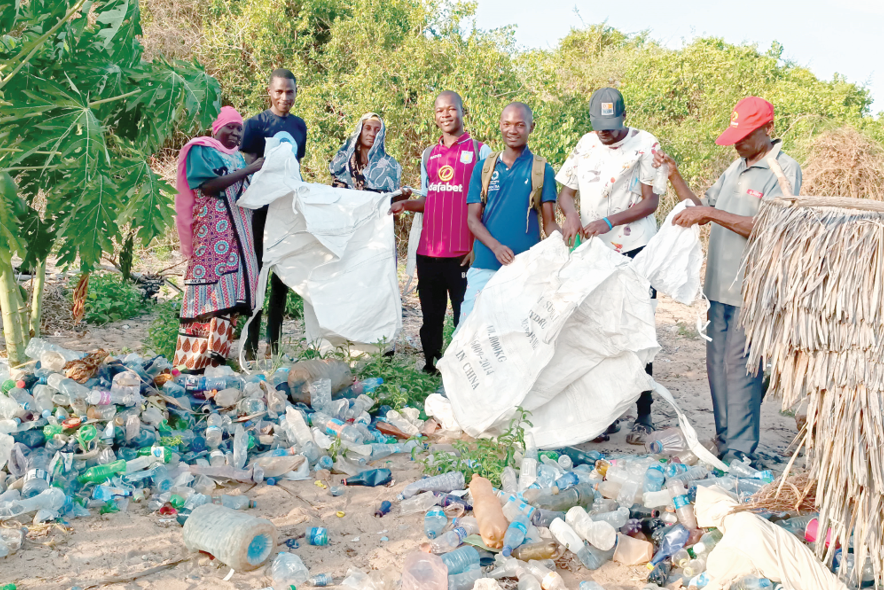Wildlife conservationist on mission to save sea turtles

Wildlife conservationist and climate activist Neville Agesa recently won the Kwale Environmentalist of the Year Award for his work to save sea turtles and other marine biodiversity crises in the vast South Coast of the Indian Ocean.
Agesa, 25, is the Chief Executive Officer at Africa Climate and Environment Foundation (ACEF) a youth-led organisation focusing on mobilising and empowering African youths to take action for climate change mitigation and environmental protection to bridge the hunger and poverty gap.
He says that ACEF is tackling three planetary crises of biodiversity loss, climate change, and pollution.
Recently, his attention has turned to documenting and tackling plastic pollution after seeing how relentless plastic pollution is putting pressure on the endangered sea turtle species along the South Coast.
Taking action
“All of this was litter and debris we picked from the ocean,” says Agesa, pointing at one of the photos of a recent beach clean-up activity in Majoreni area, Kwale County.
But it’s not only plastics that are shredding fast the frayed fabric of these global migrators; human-made physical hazards, climate change, loss of nesting habitat, and commercial fishing are also pushing them to extinction, Agesa continues.
We’re standing on the white sands of the Maji Nest Relocation site in Diani Beach, a raised location where he shows us an enclosure with sea turtle eggs with clearly marked expected hatchling dates.
Agesa explains with zest how they have been encountering plastics in sea turtles’ innards that are poached and washed ashore by the ocean waters.
Neville says that sea turtles are necessary for maintaining productive coral reef ecosystems to transporting essential nutrients from the oceans to beaches and coastal dunes.
Without them, he says, their ability to fulfill vital functions in ocean ecosystems will only remain history. “It is now a race against time to protect sea turtles,” he noted.
Although there are seven turtle species in the world today, Kenya has only five. They include the green turtle (chelonia mydas), hawksbill turtle (Eretmochelys imbricata), loggerhead turtle(Caretta caretta), Olive Ridley turtle (Lepidochelys olivacea), and leatherback turtle (Dermochelys coriacea).
The five species have been sighted at Diani Beach. Three of them have been confirmed to be laying eggs in the same region.
At the South Coast, the two major nesting species are the green turtle, which is endangered, and the hawksbill turtle, which is critically endangered according to the International Union for Conservation of Nature (IUCN).
Since turtles have been part of the Islands that stretch along Diani, it has formed part of their traditional cuisine. This only means they have become victims of poaching for food leading to the decline in their populations.
Agesa and other organisations working on turtle conservation along the coast have set out to change this.
“With the help of Diani Turtle Watch, we have hired previous poachers as monitors protecting the nesting beaches while working on changing the community’s mindset through capacity building,” he said, adding “We teach the locals that a turtle is worth more alive than dead since it’s a tourist attraction site.”
Agesa says that marine litter, specifically plastics, poses a great threat to sea turtles while on land and in marine ecosystems. Since turtles consume jellyfish, they sometimes fail to differentiate between a plastic bag and the sea creature.
“When they eat plastics thinking it is food, they become full and do not eat for a long period. This results in starvation to death while on land or sea,” Agesa said.
Plastics also pollute the sand, making it unsuitable for turtles to nest on the beaches, which are some of the most important nesting sites for turtles.
Training locals
He has formed six marine litter management groups along the coastline.
Over the past six years in Diani, the conservationist in partnership with other organisations such as Diani Turtle Watch, Kwale Plastics, and Diani Youths have created a circular economy, employing local people to clean beaches and providing work for plastic recyclers.
The wildlife expert has also trained local community-based organisations on turtle monitoring strategies and led the volunteers in eradicating the poaching of turtles in the area. A turtle takes 30-50 years to mature to start nesting and has only a life span of 90 years. It nests at intervals of two years apart. “When we lose this population, we will start complaining of biodiversity loss. We are playing our part to make sure we reverse extinction and reduce such cases. And that is why anti-poaching patrols are vital in sea turtle nesting,” explained Agesa.
Besides these, Agesa spearheaded the establishment of underwater turtle monitoring with community volunteers in Shimoni, and through his efforts, Msambweni Turtle Watch is back to life with community volunteers motivated towards conservation.
While in primary school at Amalemba Primary School in Kakamega town, he had developed a liking for birds. He recalls, “Most of the time in school I enjoyed watching birds, but at the same time, I was a bad hunter. One day I sneaked out of school and I went hunting expedition with my schoolmates. I accidentally met my father who punished me and later advised me on the importance of wildlife.”
Agesa wanted to become a police officer or game warden, but life had other plans. His love for wildlife conservation started growing in 2006. He would occasionally sneak to watch National Geo Film at a neighbour’s home.
“It was my turning point,” he said. He would later, in 2018, join Diani Turtle Watch as projects coordinator under Local Ocean Conservation. In 2021 he was named the first runner-up in the Rhino Conservation Awards 2021 in the best conservation supporter category. He also received the Africa Green Under 40 by Eleven Twelve Foundation Awards in 2022.
However, his conservation career has not been smooth. In 2022, he faced threats from poachers in the Diani area.
“I was at the forefront of fighting illegal poaching of aquarium fish from the Diani-Chale region. I remember one day I was threatened at gunpoint,” he said.
Getting sea turtle monitors, especially from the youth has not been easy. The entire Funzi Island has one sea turtle monitor that has to cover three beaches.
The underrepresentation of indigenous people during policy formulation is one of the major biodiversity policy gaps.












